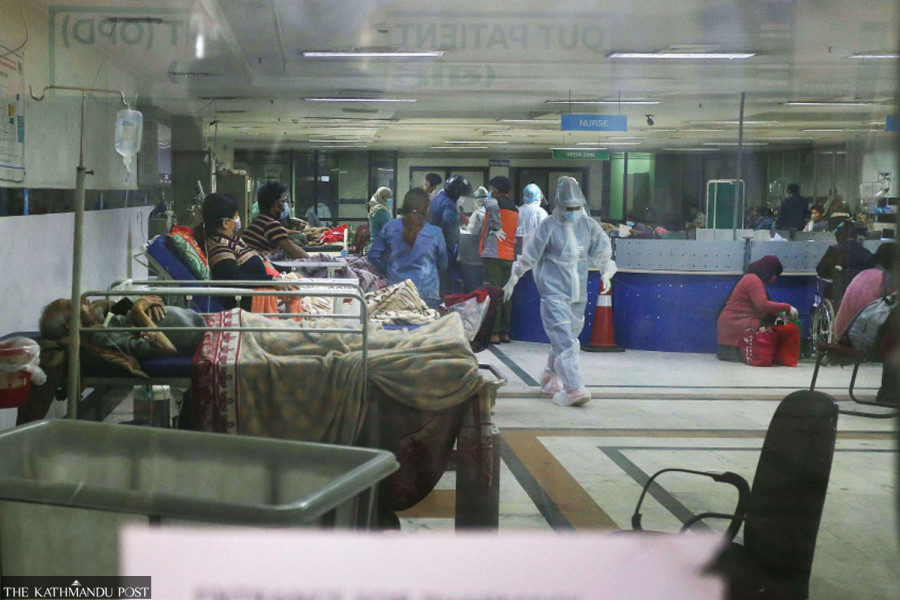Health
Complacency puts vulnerable population at higher risk of Covid infection
Laxity in safety and prevention measures could prove costly for pregnant women, new mothers and the elderly.
Arjun Poudel
On Monday, two women in labour who were taken to the Patan Hospital for delivery, tested positive for the coronavirus.
The number of pregnant women testing positive for the coronavirus has risen significantly of late, said Dr Ravi Shakya, director at the hospital. “Health condition of the infected new mothers is normal,” Shakya said, “but the infection could affect pregnant women and new mothers severely even if they are vaccinated because the immunity level decreases after a few months of vaccination.”
The spread of Covid infections at a greater speed compared to earlier months coupled with the authorities’ complacency in taking preventive measures has put the vulnerable population—pregnant women, new mothers, and the elderly population—at a higher risk.
Doctors warn that authorities’ complacency in taking measures to prevent the spread of the virus could be costly, especially for the vulnerable population.
Shakya said there are 10 infected patients admitted for treatment at Patan Hospital as of Tuesday. “The conditions of some are serious,” he said. “Infection of the virus may not cause severity in many people but the immuno-compromised population may get severely ill.”
The administration department at the Paropakar Maternity and Women’s Hospital said that coronavirus infection has been detected in a number of women getting admitted to the hospital for delivery services.
“But we have stopped testing the infection status of women in labour,” said Dr Amir Babu Shrestha, director at the Hospital. “Our health workers only take precautions to avoid transmission of infection around patients with Covid symptoms, but we do not carry out testing to know the infection status.”
Experts have attributed the community spread of the virus to new Omicron variants. But the authorities do not have real-time data on the number of people infected with the virus. Only healthy people, seeking foreign visits, have been opting for tests.
“The government has not even informed the people about the start of the fourth wave of the pandemic,” said Dr Baburam Marasini, former director at the Epidemiology and Disease Control Division. “We are so lucky that the new sub-variants of Omicron are milder compared to other variants that have previously hit the country. Thousands of people would have died in the third wave and the current wave of the virus if the variants were deadlier like the Delta variant.”
The Delta variant, which brought the second wave of the pandemic in Nepal in April last year, killed at least 8,000 people and infected hundreds of thousands. A majority of the population was infected in the third wave of the pandemic triggered by the Omicron variant that hit the country in January this year.
“As the authorities concerned have not taken any step to contain the spread of the infection in communities, people themselves have to take precautionary measures,” said Marasini. “But in our country, people also do not follow safety measures on their own accord, until it is mandated.”
On Wednesday, Nepal reported one death and 564 new cases—418 in 2,778 polymerase chain reaction tests and 146 in 1,676 antigen tests.
Active cases stand at 3,929 throughout the country as of Wednesday.
Daily test positivity rates of the polymerase chain reaction tests are over 15 percent.
“So many people are getting infected of late,” said Shakya, director of the Patan Hospital. “Over 20 percent of people undergoing tests at our hospital are testing positive for the virus.”
The Ministry of Health and Population said 32 Covid patients have been admitted to the intensive care unit, and two have been placed in ventilator support in various hospitals throughout the country.
Meanwhile, the Covid-19 Crisis Management Coordination Centre (CCMCC) said that it has been still analysing the situation to take preventive measures.
“We are still in the process of analysing the situation since a lot of people are vaccinated and the number of severely ill cases is also not so high,” said Shankar Nepal, joint secretary at the Office of the Prime Minister and Council of Ministers, who is also a member of the CCMCC.
“Our next meeting comprising experts from the Health Ministry could make a decision to strictly implement the safety measures,” he said.
When asked about the risk of transmission of the virus in schools and public places and the importance of safety measures, Nepal said that the government does not want to create panic among the public and that enforcing restrictions in schools could also affect the ongoing vaccination campaigns.
Doctors say even if coverage of the vaccine is high in Nepal, many people were inoculated some six months or more ago. Several studies, including one carried out in Nepal, show that the immunity level achieved from vaccination or natural infection wanes after six months of the vaccination or natural infection.
“Precautionary measures—wearing face masks, washing hands, maintaining social distance, avoiding crowds and public places—should be continued,” said Shrestha, director at Paropakar Maternity and Women’s Hospital. “Everyone should be cautious about the growing risk of infections and try to secure the vulnerable population—pregnant women, elderly populations and others with compromised immunity.”




 11.84°C Kathmandu
11.84°C Kathmandu















